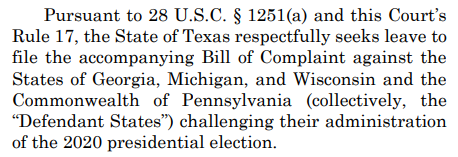
Oh goddamn the comments responding to this.
Let's rapid-fire some of these, but to begin with the most basic principle:
A sincerely held belief is protected the same as any other, there is no threshold of legitimacy for either the religion or the tenet.
1/
Let's rapid-fire some of these, but to begin with the most basic principle:
A sincerely held belief is protected the same as any other, there is no threshold of legitimacy for either the religion or the tenet.
1/
https://twitter.com/KlasfeldReports/status/1357071164007415815
Yes, it costs more money to abide by constitutional and statutory rights than to disregard them. The fact that the source of his belief comes from Wikipedia rather than the Dead Sea Scrolls is irrelevant.
2/
2/

The precedent that "the courts do not assess the legitimacy of a religious belief, just its sincerity" is long-standing.
People imprisoned by any government *should* take advantage of the right to religious accommodation.
3/
People imprisoned by any government *should* take advantage of the right to religious accommodation.
3/

There are whole lineages of cases involving the limits of "my religious beliefs are X" as applied to "therefore I must be allowed to do a crime".
Eating organic food is not a crime, this is a nonsequiter.
4/
Eating organic food is not a crime, this is a nonsequiter.
4/

If you wind up in prison and have a demonstrably sincerely held belief (e.g you refused to eat for more than a week because it did not meet that dietary limitation), you would have the same cause of action.
5/
5/

NB: that has *nothing* to do with whether there is some obligation to ensure you can follow that restriction while you're not incarcerated. Being directly in government control is very different from "the government could pay for my food if it wanted to".
6/
6/
There seems to be some confusion between "other dietary choices" and "religious restrictions on diet".
Here's a cheat sheet:
Are you picking it (including for ethical reasons), or do you think it is a spiritual obligation?
7/
Here's a cheat sheet:
Are you picking it (including for ethical reasons), or do you think it is a spiritual obligation?
7/

This is about pre-trial detention. Important suffix: "pre". It doesn't change the constitutional or statutory analysis, but it seems important to remind people that he's not "doing the time" because he hasn't been convicted of anything yet.
He's guilty as sin, but holy shit
8/
He's guilty as sin, but holy shit
8/

Because it would be extreme to deny someone their religious dietary requirements, right?
Not because of some idiotic idea that applying the same standard to this dude's beliefs that would be applied to any other beliefs is "extreme", right?
9/
Not because of some idiotic idea that applying the same standard to this dude's beliefs that would be applied to any other beliefs is "extreme", right?
9/

I mean... no. But I *can* explain why this has nothing to do with it.
A Muslim who follows Halal, or a Jew following kosher rules would get the same treatment. And have, because this is not the first religious dietary restriction case in this country.
10/
A Muslim who follows Halal, or a Jew following kosher rules would get the same treatment. And have, because this is not the first religious dietary restriction case in this country.
10/

Five minutes on Google:
Jones v. Carter, 915 F. 3d 1147 (7th Cir. 2019).
Shakur v. Schriro, 514 F.3d 878 (9th Cir. 2008).
What in the good goddamn are people talking about?
I can't say with certainty either of those plaintiffs were black, but these cases happen regularly
11/
Jones v. Carter, 915 F. 3d 1147 (7th Cir. 2019).
Shakur v. Schriro, 514 F.3d 878 (9th Cir. 2008).
What in the good goddamn are people talking about?
I can't say with certainty either of those plaintiffs were black, but these cases happen regularly
11/

People in the custody of the government (and thus receiving all their meals from the government) are protected against infringement by their food supplier *because they're in government custody*.
Do you seriously want to make that trade?
12/
Do you seriously want to make that trade?
12/

If they can show it's a sincerely-held belief, absolutely fuck yes they should.
Somehow I think people are mistaking "sincere belief in something I think is silly and not real" for "just say you have a religious belief and you win".
13/
Somehow I think people are mistaking "sincere belief in something I think is silly and not real" for "just say you have a religious belief and you win".
13/

Every religious belief can be derided as illegitimate and based on some stupid shit someone read somewhere. We *do not* want the courts in the business of deciding which religious views are "real".
14/
14/
• • •
Missing some Tweet in this thread? You can try to
force a refresh









